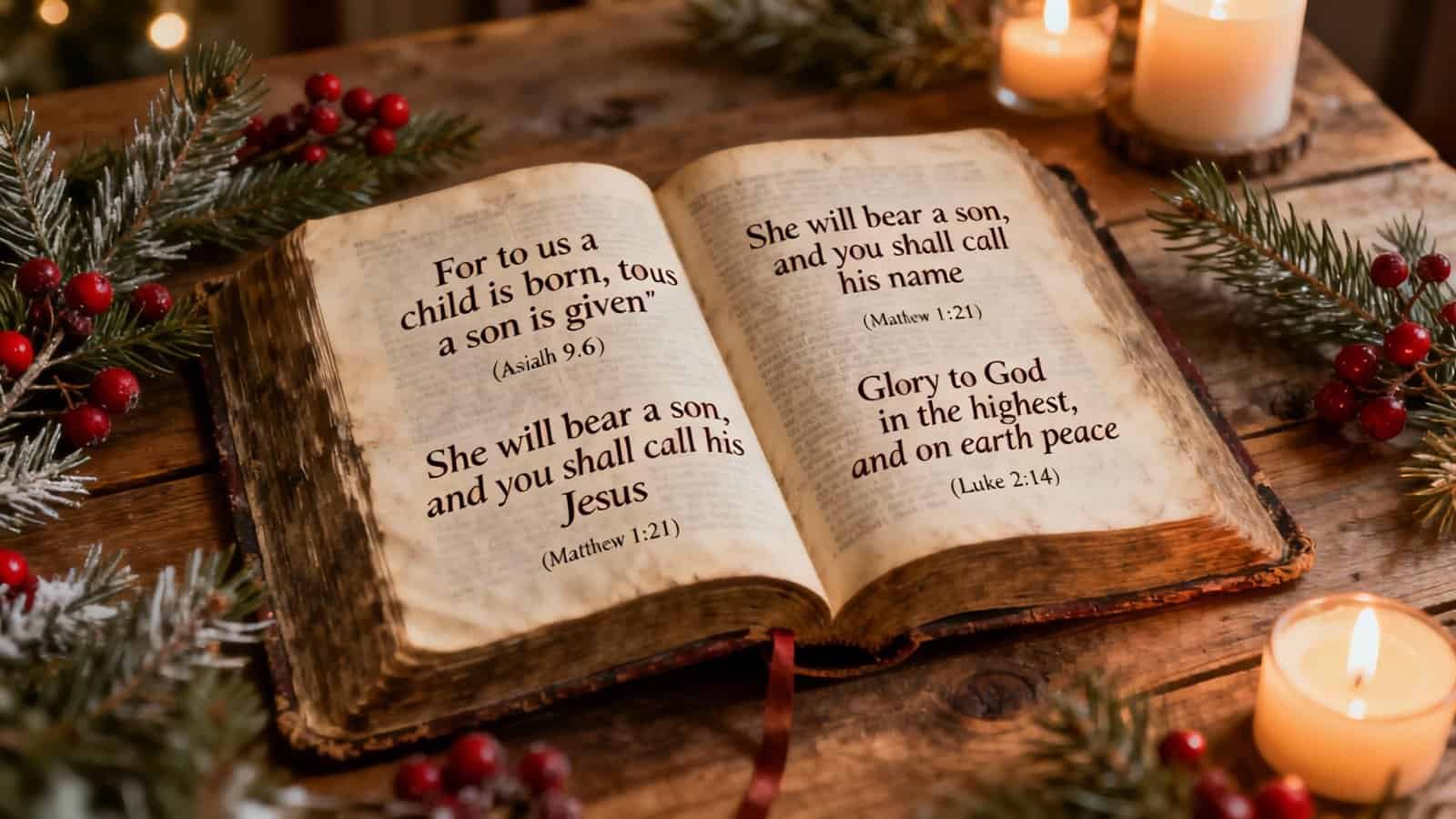
14 Nov Top 3 Short Christmas Bible Verses for Cards
You’ll transform your Christmas cards into powerful gospel messages with these three verses. Luke 2:11 proclaims “Today in the town of David a Savior has been born to you” – making Christ’s arrival personal and immediate. Isaiah 9:6 declares “For unto us a child is born” and reveals His divine titles. John 3:16 captures God’s redemptive love in one profound statement. Each verse connects the manger’s hope to eternity’s promise.
Table of Contents
Key Takeaways
- Luke 2:11 (“Today in the town of David a Savior has been born to you”) personalizes salvation with “to you” for card recipients.
- Isaiah 9:6 (“For unto us a child is born”) lists Christ’s divine titles: Wonderful Counselor, Mighty God, Everlasting Father, Prince of Peace.
- John 3:16 provides the gospel message concisely, connecting God’s love, Christ’s gift, and eternal life promise in one verse.
- These three verses capture Christmas essentials: birth announcement, prophetic fulfillment, and redemptive purpose from manger to cross.
- Each verse is brief enough for cards while delivering profound theological truth about incarnation, salvation, and God’s love.
Luke 2:11 – Today Your Savior Is Born

Hope arrives in the most unexpected places—a manger in Bethlehem where heaven touched earth. Luke 2:11 declares, “Today in the town of David a Savior has been born to you; he’s the Messiah, the Lord.” You’ll find this verse perfectly captures Christmas’s essence for your holiday cards.
The angel’s joy proclaimed to terrified shepherds transforms fear into celebration. Notice how God chose society’s outcasts as the first recipients of history’s greatest announcement. Your Savior didn’t arrive in a palace but in a humble manger, wrapped in cloth strips.
When you share this verse, you’re reminding loved ones that Christ’s birth isn’t just ancient history—it’s personal. “To you” makes salvation intimate. The word “today” brings immediacy to God’s rescue plan. You’re not celebrating a distant deity but Emmanuel, God with us, who entered your broken world to heal it completely.
Isaiah 9:6 – For Unto Us a Child Is Born
Seven centuries before Christ’s birth, Isaiah painted a portrait of the coming Messiah that still takes your breath away. This powerful Messianic prophecy doesn’t just predict a birth—it reveals the incarnational hope of God becoming flesh for humanity’s salvation.
When you read “For unto us a child is born, unto us a son is given,” you’re witnessing Isaiah’s glimpse into divine kingship. The prophet lists throne names that belong to God alone: Wonderful Counselor, Mighty God, Everlasting Father, Prince of Peace. These aren’t metaphors; they’re declarations of Christ’s deity.
The peace promise embedded in this verse transforms your Christmas cards into gospel proclamations. You’re not merely sharing seasonal greetings—you’re announcing that the government rests on Jesus’s shoulders, and His kingdom of peace will never end. This child born in Bethlehem carries the full authority of heaven, offering you eternal security through His perfect reign.
John 3:16 – God So Loved the World
Love’s magnitude reaches its pinnacle in John 3:16, the verse Martin Luther called “the gospel in miniature.” When you write these twenty-five words on a Christmas card, you’re sharing the entire redemptive story—God’s sacrificial love demonstrated through the gift of His only Son.
This verse perfectly captures Christmas’s essence because it connects the manger to the cross. You’re reminding recipients that God’s love isn’t abstract—it’s tangible, costly, and personal. The baby in Bethlehem came with divine purpose: world redemption through belief in Him.
Consider how this verse transforms your Christmas greeting. You’re not merely celebrating a birth but proclaiming eternal life’s availability to everyone who believes. It’s the ultimate inclusive message—”whoever believes” encompasses all people, regardless of background or past.
When you share John 3:16 at Christmas, you’re echoing heaven’s announcement that God’s love actively pursues humanity. The gift of Jesus surpasses every wrapped present because it offers what nothing else can: everlasting life.
Frequently Asked Questions
What’s the Proper Etiquette for Signing Religious Christmas Cards to Non-Christian Friends?
You’ll want to respect boundaries by choosing cards with general holiday themes rather than explicitly religious messages. Avoid proselytizing by focusing on shared values like peace, joy, and love. Consider writing “Season’s Greetings” or “Happy Holidays” instead of “Merry Christmas.”
Express your genuine care without imposing your faith. Scripture teaches us to love our neighbors unconditionally, so let your signature reflect Christ’s love through thoughtful consideration of their beliefs.
Should I Include the Bible Reference Numbers When Writing Verses on Cards?
You’ll want to consider your recipient when deciding whether to include references. For fellow believers, adding the citation (like “Luke 2:11”) helps them study the verse later and shows you’re sharing God’s Word intentionally.
You might omit references for non-Christian friends to keep the focus on the message’s beauty rather than its source. Either way, let the Spirit guide you—the verse’s truth matters more than its footnote.
How Early Should I Mail Christmas Cards to Ensure Timely Delivery?
You’ll want to mail early to honor recipients with timely greetings.
For domestic delivery, send cards by December 15th, though postal deadlines vary by location.
International cards need three weeks minimum.
Consider this act of planning ahead as practicing the wisdom of Proverbs 21:5 – “The plans of the diligent lead to profit.”
Your thoughtfulness in meeting these deadlines reflects Christ’s love and ensures your biblical verses arrive when they’ll bring the most joy.
Is It Appropriate to Handwrite Verses or Use Printed Labels?
Both approaches honor God’s Word beautifully. Handwritten warmth adds personal touch and shows you’ve invested time—reflecting Christ’s individual love for each person.
Printed convenience allows you to share Scripture with more people efficiently, spreading the Gospel wider. You’ll find handwriting works wonderfully for closest family and friends, while printing serves well for larger mailings.
What matters most isn’t the method but that you’re faithfully sharing God’s promises this Christmas season.
What Pen Colors Work Best for Writing on Dark-Colored Christmas Cards?
You’ll find metallic gel pens in gold, silver, or white create beautiful contrast on dark cards, making your Bible verses shine like stars proclaiming Christ’s birth.
Opaque paint pens also work wonderfully – they won’t disappear into deep reds or greens. White ink symbolizes purity and light breaking through darkness, while gold reflects heaven’s glory. Test your chosen pen on the card’s inside first to ensure smooth, visible writing that honors God’s Word.
Conclusion
You’ve discovered three powerful verses that capture Christmas’s true meaning. Whether you’re writing cards, sharing God’s love with neighbors, or teaching children about Christ’s birth, these scriptures speak eternal truth. They remind you that Christmas isn’t about presents under a tree—it’s about God’s perfect gift of salvation. As you celebrate this season, let these verses guide your heart toward worship and inspire you to share the hope, peace, and joy found only in Jesus Christ.










No Comments